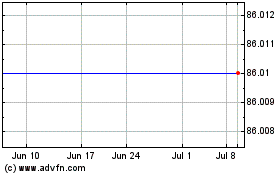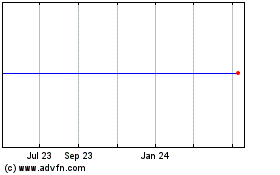By Cara Lombardo and Doug Cameron
United Technologies Corp. struck a deal to acquire military
contractor Raytheon Co., continuing the sprawling industrial
conglomerate's transformation into a company focused on aerospace
and defense.
The proposed deal intensifies the consolidation in the aerospace
and defense industry as plane makers seek better terms from
suppliers and the Pentagon puts more pressure on contractors to cut
costs and invest more of their own money in new technologies such
as space systems and cybersecurity.
The companies, with a total market value of roughly $166
billion, would become the world's second-largest
aerospace-and-defense company by sales behind Boeing Co., with
annual revenue of more than $70 billion last year.
"There is some truth to the idea that bigger is better,"
Jefferies analyst Sheila Kahyaoglu wrote in a note to clients
Sunday. "With common customers there is some leverage to size and
the supply chain."
The Journal first reported Saturday that the two sides were
nearing a deal.
The combined entity would be split roughly 50/50 between
commercial and defense sales, though military is likely to shrink
as a proportion as UTC's Pratt & Whitney division ramps up
deliveries of its latest jetliner engines. A third of the two
companies' aerospace and defense revenues last year -- some $25
billion -- came from the Pentagon.
Byron Callan, a defense analyst at Capital Alpha LLC., said the
proposed deal reflected the likely slowing of military spending
increases and the need for companies to boost their investment in
new technologies.
The tie-up would complete a radical transformation at UTC, a
once sprawling conglomerate that already plans to spin off its Otis
elevator and Carrier building-systems businesses into separate
companies.
Raytheon would be combining with UTC's' remaining aerospace
business, and all the transactions would take place at the same
time. UTC has said the spinoffs will take place in the first half
of next year.
The deal would be one of the largest of the year and isn't
expected to attract significant antitrust scrutiny, analysts say,
because UTC and Raytheon don't compete against each other in most
of their markets.
The deal unites Pratt & Whitney engines used on commercial
planes and the F-35 combat jet, with Raytheon, which produces
missiles such as the Tomahawk together with radars and other
electronic-warfare systems.
"There is minimal overlap for the two companies," said Ms.
Kahyaoglu, predicting few antitrust issues for the deal. The
companies could mutually benefit from their separate expertise, she
said, such as leveraging UTC's expertise in global positioning
systems across Raytheon's missile programs.
The deal would be one of the largest in a year that has included
some big mergers but otherwise has been lackluster. Right now the
biggest proposed acquisition is Bristol-Myers Squibb Co.'s $74
billion purchase of rival drugmaker Celgene Corp.
Farmington, Conn.-based UTC, which acquired Rockwell Collins for
$23 billion late last year, is one of America's last remaining big
industrial conglomerates -- though it is set to radically transform
with the spinoffs and now the merger.
The Otis elevator division and Carrier building-systems
businesses will become separate publicly traded companies, leaving
UTC as a pure-play aerospace company. The rationale for the split
was clear in the company's first-quarter results as the aerospace
portions of its business posted strong growth.
Investors are pressuring traditional conglomerates to become
more focused. Rivals Honeywell International Inc. and General
Electric Co. are both shaving off units to streamline their
businesses. Several activist investors had pushed UTC to split, and
Mr. Hayes has openly expressed his preference for smaller, more
focused companies.
Waltham, Mass.-based Raytheon sales rose 6.7% last year to $27.1
billion but it has largely avoided big deals. It has invested
heavily in recent years ahead of the recent uptick in Pentagon
spending, and has the biggest export business among the five
largest U.S. defense contractors.
In addition to other benefits from increased scale, analysts say
the proposed deal could help the enlarged company weather any
slowdown in the commercial aerospace and defense markets.
While commercial aircraft sales have been booming during an
unprecedented 13-year surge in orders that has left Airbus and
Boeing with backlogs of more than 13,000 jetliners, analysts have
cautioned that slowing air traffic could force aircraft makers to
reverse production increases.
The two-year uptick in Pentagon spending on new aircraft,
missiles and other defense equipment is also running out of steam,
with analysts projecting muted growth over the next several
years.
Pentagon spending fell sharply between 2013 and 2017 because of
broader federal budget pressures and then expanded at a clip of
around 10% in the final Obama administration budget and the first
two of the Trump administration. Spending increases are now slowing
to low single-digit increases, and much of the additional money is
being directed at refreshing U.S. nuclear forces.
Before World War II, the government relied on a mix of
federally-funded arsenals and civilian companies to provide war
materiel, though after the war that trend shifted to private
industry providing the bulk of the Pentagon's needs, according to a
report on industry consolidation released earlier this year from
the Center for Strategic and International Studies, a
Washington-based think tank.
After the Cold War, lawmakers and other policy makers helped
spur a push toward industry consolidation amid a perception of
dwindling enemy threats to the U.S. combined with budget drawdowns,
which left substantial excess capacity. From 1993 to 2000, the
number of what are considered prime contractors for the Defense
Department fell from 50 to six, researchers found.
Just as major mergers were being wrapped up, the U.S. was
attacked on Sept. 11, 2001, launching the country into the longest
war in its history. Under the Trump administration, defense budgets
have soared as U.S., European and other manufacturers have boosted
production.
UTC and Raytheon are both well positioned in the F-35 program,
where production is increasing. Raytheon also has big franchises in
missile defense with the Patriot system -- a big seller overseas --
and munitions such as the Tomahawk cruise missile.
"The potential for defense budgets to flatten in the next couple
of years could add a sense of urgency" for companies to reposition
themselves, Ms. Kahyaoglu at Jefferies said.
--Thomas Gryta and Ben Kesling contributed to this article.
Write to Cara Lombardo at cara.lombardo@wsj.com and Doug Cameron
at doug.cameron@wsj.com
(END) Dow Jones Newswires
June 09, 2019 16:56 ET (20:56 GMT)
Copyright (c) 2019 Dow Jones & Company, Inc.
United Technologies (NYSE:UTX)
Historical Stock Chart
From Mar 2024 to Apr 2024

United Technologies (NYSE:UTX)
Historical Stock Chart
From Apr 2023 to Apr 2024
